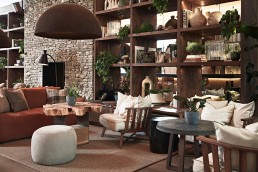Heimtextil Trends 2024 will focus on textile transformation, under its latest theme ‘New Sensitivity’.
The event will explore three key ways to take a sensitive approach to textiles: the plant-based production of textiles, supporting textile cycles with technology, and the bio-engineered use of natural ingredients.
Following the previous edition’s focus on circular solutions, Heimtextil Trends 24/25 will continue to focus on transformative textile innovations. With a theme of ‘New Sensitivity’, the event will focus on changes in the composition and aesthetics of textiles. “In this context, sensitivity means considering the impact on the environment when making a decision or creating a product,” explains Anja Bisgaard Gaede, founder of SPOTT. “Understanding how natural ecosystems work and prioritising balance as the default are key.”
Plant-based: textiles made from plant crops or plant by-products
One key realm set to be explored at Heimtextil Trends 2024 is plant-based textiles, whereby fibres are derived from something that grows, rather than being synthetically produced. More sustainable and able to recirculate in existing ecosystems, plant-based textiles can be made from the like of cactus, hemp, abaca and seaweed, as well as from leftover raw production materials like banana, olive and persimmon.
Technological: technology and technical solutions transforming textiles
The second key sphere underpinning the next Heimtextil Trends will be technology, which can support the transformation of textiles through the upcycling and recycling of textiles, textile construction and textile design. Developing technologies for recycling textile waste and methods for upcycling textiles increases the circular usage of existing textiles, while offering pathways to new sustainable solutions, such as using knitting technology for furniture upholstery, which produces less fabric waste.
Bio-engineered: engineered to enhance bio-degrading
Finally, the latest installation of Heimtextil Trends will explore bio-engineered textiles, which are a fusion of plant-based and technological textiles. Bio-engineered textiles bring new sustainable advantages, with some of the same functionalities as synthetically produced textiles, while still being biodegradable because of their natural origins. Biodegradable fibres can be added to conventional textiles like polyester to enhance the conventional textiles’ ability to revert to materials found in nature, and hence biodegrade in natural environments such as water or soil.
The next Heimtextil will be held from 9 to 12 January 2024. Find out more at www.heimtextil.messefrankfurt.com
CREDITS
Photography: © Inge Lynggaard Hansen
Related Posts
15 September 2023
Zetter Hotels announces first opening in ten years
15 September 2023
AHEAD Europe 2023 shortlist announced
13 September 2023



